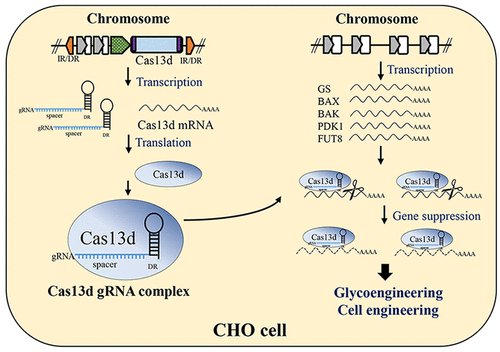当前位置:
X-MOL 学术
›
ACS Synth. Biol.
›
论文详情
Our official English website, www.x-mol.net, welcomes your
feedback! (Note: you will need to create a separate account there.)
CRISPR-Cas13d for Gene Knockdown and Engineering of CHO Cells.
ACS Synthetic Biology ( IF 3.7 ) Pub Date : 2020-09-10 , DOI: 10.1021/acssynbio.0c00338 Chih-Che Shen,Mei-Wei Lin,Bao Khanh Thi Nguyen,Chin-Wei Chang,Jie-Ru Shih,Mai Thanh Thi Nguyen,Yi-Hao Chang,Yu-Chen Hu
ACS Synthetic Biology ( IF 3.7 ) Pub Date : 2020-09-10 , DOI: 10.1021/acssynbio.0c00338 Chih-Che Shen,Mei-Wei Lin,Bao Khanh Thi Nguyen,Chin-Wei Chang,Jie-Ru Shih,Mai Thanh Thi Nguyen,Yi-Hao Chang,Yu-Chen Hu

|
Chinese hamster ovary (CHO) cells are the predominant cell chassis for biopharmaceutical production. Engineering cellular pathways related to cell death, metabolism, and glycosylation in CHO cells is desired but challenging. Here, we present a novel approach that exploits CRISPR-Cas13d for gene silencing and CHO cell engineering. CRISPR-Cas13d is a burgeoning system that exploits Cas13d nuclease and guide RNA (gRNA) for RNA cleavage and gene knockdown. We first showed that CRISPR-Cas13d effectively knocked down exogenous genes in CHO cell lines (K1, DG44, and DUXB11) commonly used for recombinant protein production. We next demonstrated that CRISPR-Cas13d robustly suppressed the expression of exogenous genes and various endogenous genes involved in gene amplification, apoptosis, metabolism, and glycosylation (e.g., GS, BAK, BAX, PDK1, and FUT8) in CHO cells with efficiencies ranging from 60% to 80%, simply by transient transfection. By integrating the entire CRISPR-Cas13d system with the Sleeping Beauty system and optimal gRNA design, we further improved the knockdown efficiency and rapidly generated stable cells with ≈80%–90% knockdown. With this approach, we knocked down FUT8 expression for >90% and significantly attenuated the IgG fucosylation. These data altogether implicated the potentials of CRISPR-Cas13d for gene regulation, glycoengineering, and cell engineering of CHO cells.
更新日期:2020-10-17











































 京公网安备 11010802027423号
京公网安备 11010802027423号